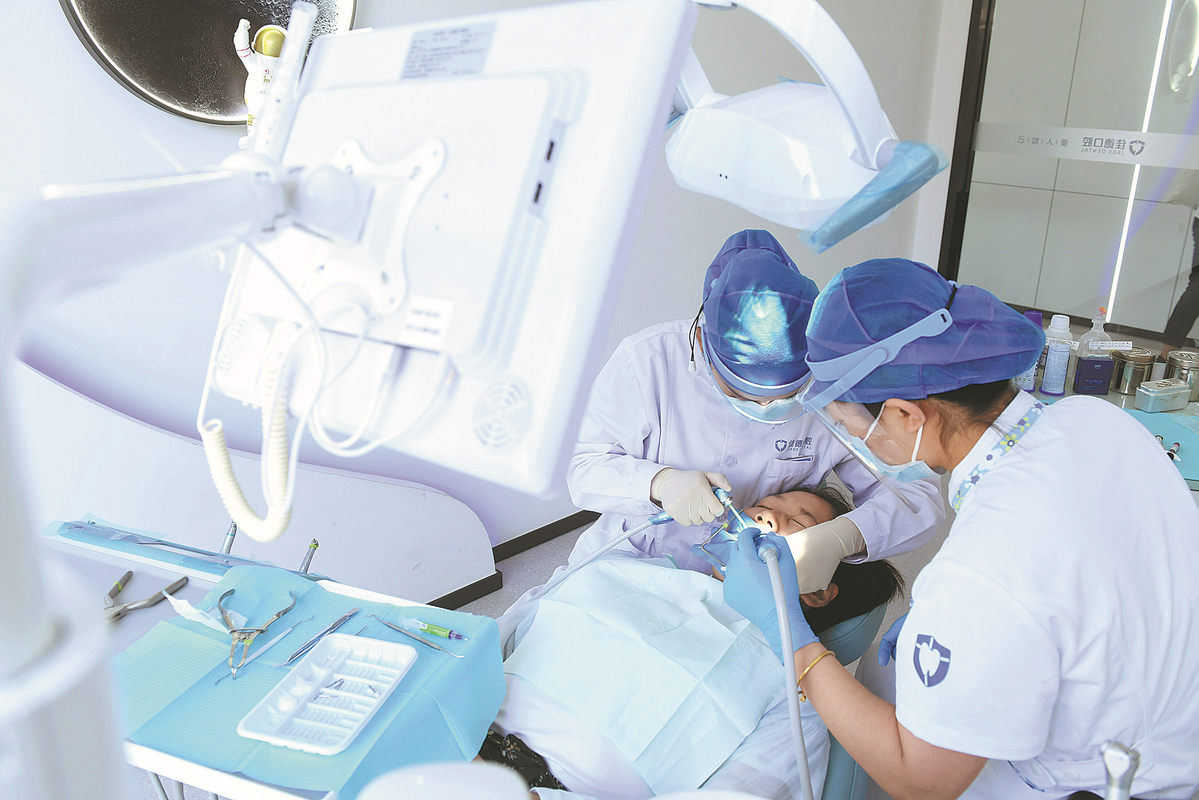Smiling through the pain


Dental implant industry poised to pivot after recently announced price cuts
China's dental implant industry is expected to undergo a major transformation amid rapidly falling prices.
The country's first bulk procurement program targeting dental implants has seen prices reduce on average by about 55 percent, according to the National Healthcare Security Administration.
The program mainly targets public hospitals, covering 72 percent of annual demand for dental implants across the country, and patients are expected to save 4 billion yuan ($554.5 million) as a result, the administration said.
The price cut took effect in late March or mid-April, depending on the region.
The dental implantation procedure to replace missing or decaying teeth incurs the cost of medical consumables, such as dental implants and crowns, as well as medical service fees.
Previously, the total cost of dental implant surgery was as high as 30,000 yuan.
According to a survey led by the administration in September 2022, about 60 percent of respondents had complained about the differential pricing and called for a centralized procurement program to make the service more affordable.
The adjusted service fee for dental implants in public 3A-grade hospitals is 4,500 yuan per tooth.
"The rapid price drop in dental implants has brought a major turning point for the dental industry," said Hu Xuan, a medical devices analyst at vbdata.cn, a Chongqing-based healthcare service platform.
"The price drop will help increase patient visits to dental institutions, especially during the basic treatment link. In addition, the bulk procurement program mainly targets public hospitals, and private institutions can still maintain autonomy, bringing a positive influence to the overall industry," he said.
Industry experts said domestic substitution will be accelerated in the upstream consumables end of the chain.
Homegrown dental implants came on the scene recently and the market share of domestic brands is relatively low.
Data from vbdata.cn showed that by the end of 2021, about 117 implant products were registered and launched in China, of which 99 were imported products. The market share of domestic brands was only 15 percent.
"Dental implants made in China lacked in technique and experience, and there was not enough clinical data support," Hu said.
In terms of technique, Chinese enterprises were merely followers.
Citing surface treatment technology as an example, Nobel Biocare and Straumann — two leading international brands — adopt fourth-generation technology of anodizing treatment and hydrophilic sandblasting acid etching treatment, respectively, which have better biocompatibility, corrosion resistance and strength.
In contrast, domestic companies still adopt second- to third-generation technology of simple coating and sandblasting acid etching treatment, he said.
"In addition, there is not enough clinical trial data going back 5-10 years for domestic dental implants. Dentists have concerns while choosing domestic dental implant brands, which also leads to the insufficient use of domestic products," Hu said.
"The bulk procurement program will promote the development of domestic dental implant brands, as it offers homegrown companies a good window period, during which two to three dark horses are expected to stand out," said Lyu Sang, a strategy consultant of Denfac, an oral medical device research and development enterprise based in Wuxi, Jiangsu province.
"The dental implant industry develops through rising orders. Once orders go up, enterprises will make more profits. Through the national-level or provincial-level bulk procurement programs, the market share of domestic dental implant enterprises is expected to rise.
"However, once enterprises win the bid, demand for production capacity, supply chain delivery and personalized clinical guidance all raise challenges for domestic brands. They should ramp up efforts to rise up to the challenges," he said.
In the downstream segment, the service quality of dentists will become a key competition focus for the market, as the bulk procurement program makes prices of consumables transparent, and for medical institutions, the only competition points are service, skill and talent, market insiders said.
"Judging from the NHSA notice, the price premium for high-quality services of dental implants is allowed, as the notice offered the example that in regions with advanced dental implant skills, the price premium rate can be up to 20 percent," Hu from vbdata.cn said.
Likewise, for the National Center of Stomatology, medical institutions with a dental implant specialty listed in national key clinical specialties and medical institutions with high success rates of dental implants, transparent service quality information, and commitment to accept supervision and inspection, the price premium rate is 10 percent, according to the notice.
"I think the current pricing of national centralized procurement is fair. A reasonable price is the guarantee of quality," said Zhu Liya, co-founder and CEO of Shanghai-based Mei Wei Dental Group.
Besides, the Matthew Effect in downstream services — where large companies are getting bigger and small ones contract — will increase, Hu said.




































